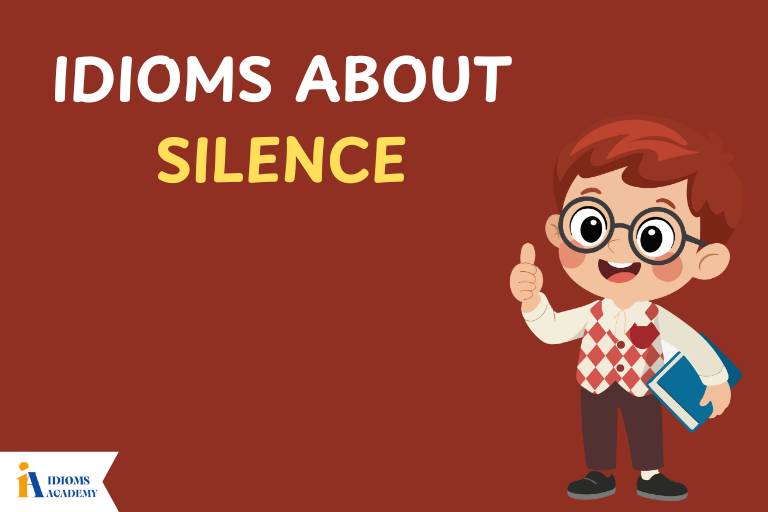Have you ever told a story and wanted it to sound more fun or interesting? People often use special expressions called idioms to make their stories more exciting. These idioms help the listener picture what’s happening. They also make the story easier to understand and more fun to hear. Idioms are phrases that don’t mean exactly what the words say, but they have a clear meaning that people learn over time.
In this article, we will look at idioms that are great for telling a story. These phrases are used in everyday talking and writing. You might hear them in books, movies, or even from your teacher or friends. Learning these idioms will help you tell stories that people want to listen to. Let’s explore 25 idioms that will make your stories more lively.
Idioms for Telling a Story
1. Once upon a time
Meaning: The beginning of a story from the past
Example Sentence:
• Once upon a time, there was a boy who could talk to animals.
• Once upon a time, my grandma lived on a farm.
Other ways to say: Long ago, In the old days
Fun Fact/Origin: This phrase comes from fairy tales and old stories.
Usage: Used to begin a story from the past.
2. Spill the beans
Meaning: To tell a secret or surprise
Example Sentence:
• Jake spilled the beans about the surprise party.
• Don’t spill the beans before her birthday!
Other ways to say: Tell the secret, Let it slip
Fun Fact/Origin: This idiom may have come from voting with beans in ancient Greece.
Usage: Used when someone tells something they were supposed to keep quiet.
3. Make a long story short
Meaning: To skip details and tell only the main point
Example Sentence:
• To make a long story short, we missed the bus and had to walk.
• She fell, laughed, and to make a long story short, made new friends.
Other ways to say: In short, To sum it up
Fun Fact/Origin: This idiom is often used when someone talks too much.
Usage: Used when someone wants to tell a story quickly.
4. Hit the nail on the head
Meaning: To say something exactly right
Example Sentence:
• When she guessed the answer, she hit the nail on the head.
• He hit the nail on the head when he said I was nervous.
Other ways to say: Be right, Get it exactly
Fun Fact/Origin: It comes from hammering — hitting the nail just right.
Usage: Used when someone gives a perfect answer or idea.
5. A fish out of water
Meaning: To feel out of place or uncomfortable
Example Sentence:
• I felt like a fish out of water at the dance.
• He was like a fish out of water on his first day at a new school.
Other ways to say: Not fitting in, Feeling awkward
Fun Fact/Origin: Fish can’t live well outside water, just like people feel strange in new places.
Usage: Used when someone feels they don’t belong.
6. Let the cat out of the bag
Meaning: To accidentally share a secret
Example Sentence:
• He let the cat out of the bag about the gift.
• I didn’t mean to let the cat out of the bag!
Other ways to say: Leak a secret, Give it away
Fun Fact/Origin: This might come from markets where people hid things in bags.
Usage: Used when a secret is told too soon.
7. Bite your tongue
Meaning: To stop yourself from saying something
Example Sentence:
• I had to bite my tongue not to laugh during the speech.
• She bit her tongue instead of yelling back.
Other ways to say: Keep quiet, Hold back
Fun Fact/Origin: It’s a way to say someone is controlling their words.
Usage: Used when someone wants to say something but doesn’t.
8. In hot water
Meaning: In trouble
Example Sentence:
• I was in hot water for forgetting my homework.
• He got in hot water for playing games in class.
Other ways to say: In trouble, In a mess
Fun Fact/Origin: Hot water used to be a symbol of danger.
Usage: Used when someone has done something wrong.
9. Jump to conclusions
Meaning: To decide something without enough information
Example Sentence:
• Don’t jump to conclusions — maybe he’s just late.
• She thought I was mad, but she jumped to conclusions.
Other ways to say: Assume, Guess too fast
Fun Fact/Origin: This idiom warns about rushing to judge.
Usage: Used when someone makes a fast decision without knowing all facts.
10. Cry over spilled milk
Meaning: To be upset about something that already happened and can’t be changed
Example Sentence:
• Don’t cry over spilled milk. We can clean it up.
• She dropped the cake, but it’s no use crying over spilled milk.
Other ways to say: Let it go, It’s done
Fun Fact/Origin: Comes from when milk was hard to clean, but being upset didn’t help.
Usage: Used to say, “What’s done is done.”
11. Read between the lines
Meaning: To find the hidden meaning
Example Sentence:
• He didn’t say he was upset, but I read between the lines.
• You need to read between the lines to understand the story.
Other ways to say: Look deeper, Notice clues
Fun Fact/Origin: Used when people wrote secret messages in letters.
Usage: Used when someone understands more than what is clearly said.
12. Put two and two together
Meaning: To figure something out
Example Sentence:
• When I saw the gift and the card, I put two and two together.
• He put two and two together and guessed the surprise.
Other ways to say: Figure it out, Solve it
Fun Fact/Origin: It’s like solving a simple math problem.
Usage: Used when someone understands something from clues.
13. Out of the blue
Meaning: Suddenly and without warning
Example Sentence:
• Out of the blue, he called me after a year.
• The storm came out of the blue during recess.
Other ways to say: All of a sudden, Without warning
Fun Fact/Origin: Blue skies are calm, so something from them is unexpected.
Usage: Used when something happens without a sign.
14. Pull someone’s leg
Meaning: To joke or trick someone
Example Sentence:
• Are you pulling my leg, or is that true?
• He was just pulling my leg about the test.
Other ways to say: Tease, Joke
Fun Fact/Origin: May come from old street thieves who tripped people.
Usage: Used when someone is kidding.
15. Break the ice
Meaning: To start talking in an awkward situation
Example Sentence:
• I told a joke to break the ice at the new school.
• Games help break the ice at parties.
Other ways to say: Start things off, Make people feel comfortable
Fun Fact/Origin: Icebreaking ships help others move forward — like people in talks.
Usage: Used when making new situations more friendly.
16. Back to square one
Meaning: To start over
Example Sentence:
• When the project failed, we were back to square one.
• We lost the map and had to go back to square one.
Other ways to say: Start again, Begin from the top
Fun Fact/Origin: Comes from board games where you go back to the first square.
Usage: Used when something doesn’t work and you have to restart.
17. Piece of cake
Meaning: Very easy
Example Sentence:
• That test was a piece of cake.
• Riding a bike is a piece of cake for me.
Other ways to say: Easy as pie, Super simple
Fun Fact/Origin: Cakes are seen as sweet and easy to enjoy.
Usage: Used when something is not hard to do.
18. Blow things out of proportion
Meaning: To make something seem bigger or worse than it is
Example Sentence:
• She blew the whole mess out of proportion.
• It’s just a small mistake — don’t blow it out of proportion.
Other ways to say: Overreact, Make a big deal
Fun Fact/Origin: “Proportion” means the right size or importance.
Usage: Used when people make small problems sound huge.
19. At the drop of a hat
Meaning: Right away, without thinking
Example Sentence:
• She’ll sing at the drop of a hat.
• He’ll go to the park at the drop of a hat.
Other ways to say: Right away, In a flash
Fun Fact/Origin: Long ago, people dropped a hat to start a race.
Usage: Used when someone is ready to act fast.
20. Bend over backward
Meaning: To try very hard to help
Example Sentence:
• I bent over backward to help her study.
• They bent over backward to welcome us.
Other ways to say: Try hard, Do extra work
Fun Fact/Origin: Comes from the idea of a person doing something really hard — like bending.
Usage: Used when someone is very helpful.
21. Throw in the towel
Meaning: To give up
Example Sentence:
• I threw in the towel after trying three times.
• He didn’t want to throw in the towel, but he was too tired.
Other ways to say: Give up, Quit
Fun Fact/Origin: Comes from boxing — when a fighter quits, they toss in the towel.
Usage: Used when someone decides to stop trying.
22. On the tip of my tongue
Meaning: You almost remember something but can’t
Example Sentence:
• Her name is on the tip of my tongue.
• I know the answer — it’s on the tip of my tongue!
Other ways to say: Almost remembered, Nearly said
Fun Fact/Origin: It feels like the words are just about to come out.
Usage: Used when someone forgets something but almost remembers.
23. Take it with a grain of salt
Meaning: Don’t believe everything fully
Example Sentence:
• Take his story with a grain of salt. He likes to joke.
• I heard it, but I took it with a grain of salt.
Other ways to say: Be careful, Don’t trust too fast
Fun Fact/Origin: Salt used to make food safe — this means be cautious.
Usage: Used when not everything said is true.
24. Shoot the breeze
Meaning: To talk about nothing important
Example Sentence:
• We shot the breeze all afternoon.
• They sat on the porch and shot the breeze.
Other ways to say: Chat, Talk casually
Fun Fact/Origin: “Breeze” means light wind, just like light talk.
Usage: Used when friends talk just to enjoy the time.
25. The plot thickens
Meaning: The story is getting more interesting or confusing
Example Sentence:
• When we found the map, the plot thickened.
• The plot thickens — now someone else knows the secret.
Other ways to say: Things are getting tricky, Now it’s getting good
Fun Fact/Origin: Comes from mystery stories with twists.
Usage: Used when something surprising happens in a story.
Quiz: Idioms for Telling a Story
Instructions: Choose the best answer for each question. Each question tests your understanding of idioms for telling a story.
Question Key
1. What does “spill the beans” mean?
A) Cook dinner
B) Tell a secret
C) Drop food on the floor
2. If someone says “make a long story short,” what are they doing?
A) Telling a short story
B) Ending the story early
C) Skipping details to tell the main part
3. What does it mean if someone is “in hot water”?
A) They are relaxing
B) They are in trouble
C) They are swimming
4. What does “read between the lines” mean?
A) To read carefully
B) To look for hidden meanings
C) To guess the next line in a book
5. If a story “comes out of the blue,” what does that mean?
A) It came slowly
B) It was expected
C) It happened suddenly
6. What does “break the ice” mean in a story?
A) Break something cold
B) Start talking in a new or quiet group
C) Freeze something
7. What does “on the tip of my tongue” mean?
A) You want to eat something
B) You almost remember something
C) You are shouting loudly
8. What does “throw in the towel” mean?
A) Start a fight
B) Quit trying
C) Dry your hands
9. What does “shoot the breeze” mean?
A) Chase the wind
B) Talk about the weather
C) Talk casually without a plan
10. If someone says “the plot thickens,” what do they mean?
A) The story is getting more interesting
B) The story is ending
C) The story is getting shorter
Answer Key
- B) Tell a secret
- C) Skipping details to tell the main part
- B) They are in trouble
- B) To look for hidden meanings
- C) It happened suddenly
- B) Start talking in a new or quiet group
- B) You almost remember something
- B) Quit trying
- C) Talk casually without a plan
- A) The story is getting more interesting
Wrapping Up
Idioms help stories sound more fun and real. They add color to what we say and make things easier to picture. When you use idioms like “spill the beans” or “read between the lines,” your stories become more interesting to others.
Try using a few of these idioms the next time you share a story with your friends or family. It makes your words more fun to listen to and shows that you’re becoming a better storyteller.



